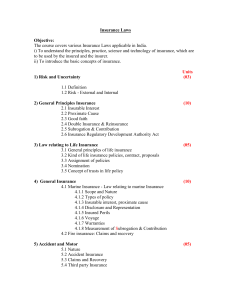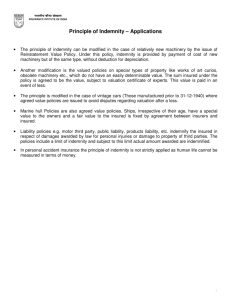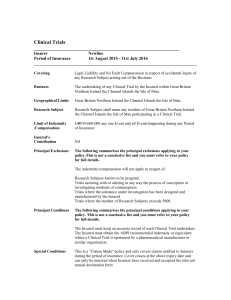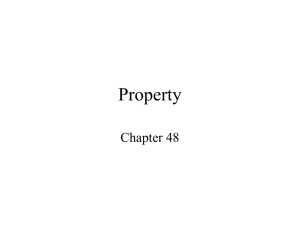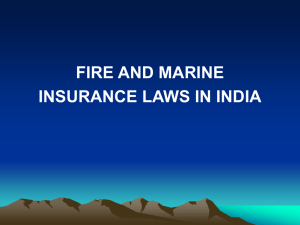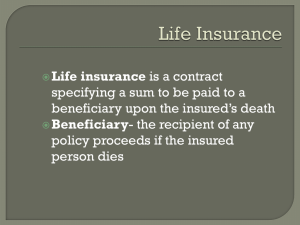insurance - Vizagcityonline
advertisement
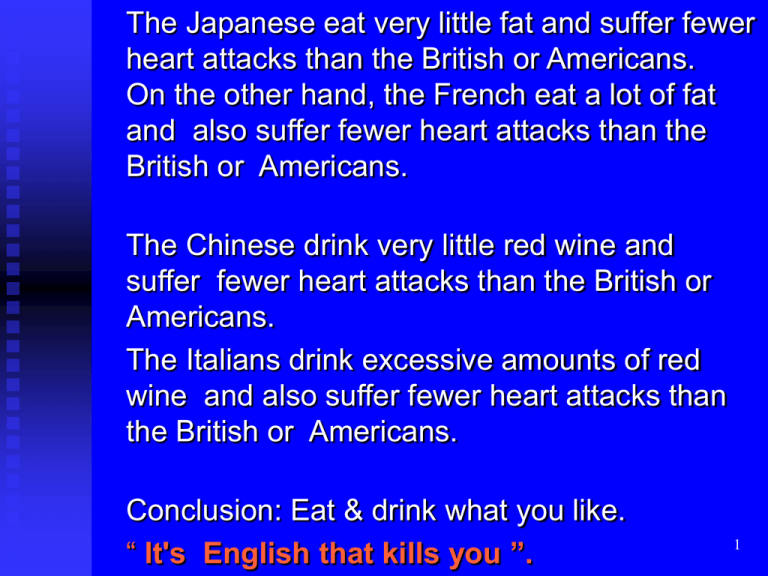
The Japanese eat very little fat and suffer fewer heart attacks than the British or Americans. On the other hand, the French eat a lot of fat and also suffer fewer heart attacks than the British or Americans. The Chinese drink very little red wine and suffer fewer heart attacks than the British or Americans. The Italians drink excessive amounts of red wine and also suffer fewer heart attacks than the British or Americans. Conclusion: Eat & drink what you like. “ It's English that kills you ”. 1 INSURANCE 2 Insurance in broad terms may be described as a method of sharing financial losses of few from a common fund who are equally exposed to the same loss. 3 Example Say 1000 motor cars valued @ 300000/- are observed over a period of five years. On an average say per year two are total loss by accident. Then the total annual loss would be Rs.600000. If the loss is to shared by all the thousand owners then they have to contribute Rs.600/The loss experience will be established by taking the past experience, geographical area in which the vehicles are used and density of traffic. 4 PRINCIPLES OF INSURANCE A.Rate B.The of contribution or premium degree of hazard it is exposed to. C.Classification of various types of properties. 5 IMPORTANT ELEMENTS INVOLVED IN THE CONCEPT OF INSURANCE Subject matter of insurance. The PERIL (risk) The financial loss. 6 Subject matter is property, human life, machinery, goods etc., Peril is fire, storm, burglary, earth quake, injury, explosion etc., Financial loss is normally defined before the contract is signed. 7 RISK RISK:- can be defined as the unforeseen element which may impede your progress in achieving the objective. 8 In insurance jargon they term RISK as an uncertainty regarding loss or what is termed as a FORTUITOUS risk. Concept of chance and risk can be expressed in a single mathematical term called “Probability”. 9 An example of impossibility can be quoted say the 9/11 incident where insurance companies were washed out. Hyderabadis never in their dreams thought of taking cover for flood. When the encroached drains could not contain rains for 2 days, the resultant floods had washed away score of vehicles, property etc., So, Risk is inherent in human existence. Human life and material possessions are constantly exposed to loss or damage due to the mechanizations of fortuitous circumstances 10 A RISK OF TRADE is a loss due to a specified event say fire, storms burglary etc., These are classified and their frequency in already assessed. A TRADE RISK is a risk of loss inherent in the trade itself. Broadly speaking we can say loss of profit as a result of change due to market collapse, political factors etc., Risk of trade is insurable as it is already assessed, Trade risk is yet to be classified and hence majority of these are not covered. 11 MATHEMETICAL VALUE OF RISK L/V x 100 where L= total losses reported V=refers to the total values the product of the above analysis is called Law of averages or the doctrine of probability. So premium rates depend upon past loss experience by systematically classifying the risks. Which are homogenous in characters Example:- Motor vehicle. 12 ITC RICE INSURANCE ATFL EMMSONS 13 SCOPE OF INSURANCE: General Insurance is divided into three categories: FIRE, MARINE & MISCELLANEOUS 14 FIRE INSURANCE FIRE INSURANCE BUSINESS: Loss due to FIRE, LIGHTINING, EXPLOSION, IMPLOSION,, RIOTS & STRIKES, IMPACT BY RAIL, AIRCRAFT DAMAGE, EARTH QUAKE, FLOOD, STORM, TEMPEST, TORNADO, TYPHOON, CYCLONES & LAND SLIDE. 15 MARINE INSURANCE BUSINESS: This is the oldest branch of Insurance comprising HULL & CARGO. Hull Insurance deals the Loss associated with floating crafts, Cargo insurance provides cover in respect of loss or damage to goods during transit by rail, road, sea or air. 16 MISCELLENOUS INSURANCE BUSINESS: Mainly includes the motor business, accident, aviation , engineering and guarantee insurances. 17 CONTRACT OF INSURANCE In between the insured and insurer INSURED:- Party effecting insurance, (Individual, Company, Firm, Corporate body etc., with legal status) INSURER:- Party granting the protection under an insurance policy. Policy:- Is the evidence of contract 18 Insurance contracts are governed by Indian contract act 1872 which states that to be legally valid following elements should be in order. A. Offer and acceptance B. Consideration C. Agreement between the parties D. Capacity of the parties E. Legality of the contract 19 UTMOST GOOD FAITH: The greatest degree of good faith by law, is expected from the proposer, that is the main reason why good faith in case of Insurance contracts becomes UTMOST good faith. It is the duty of the proposer to disclose all material facts not only already known but also extends to material facts which he ought to know. 20 Examples of material facts: FIRE: Construction of building, type occupancy, nature of good stored etc. of MARINE: method of packing, inherent vice etc. 21 INSURABLE INTREST In nutshell if property is the subject matter of insurance then the subject matter of insurance contract is the insured’s pecuniary interest in that property. LEGAL RIGHT TO INSURE INSURABLE INTEREST. Insurable required to support the contract of in order to make it legal, other contract is null and void. IS THE Interest is Insurance wise the 22 HOW INSURABLE INTEREST ARISES: 1. 2. 3. 4. 5. By ownership By Law By Contract By Legal liability Interest of a Person in Life 23 When insurable interest must exist: For Fire or Miscellaneous policy the insurable interest must exist at the time of taking the policy and at the time of the loss. For Marine policy an insurable interest need not exist at the time of policy taking. 24 WARRANTY: means an assurance by the assured, that he will not do some particular things or will fulfill any conditions that are laid in advance. WARRANTIES are further classified as express or implied 25 ASSIGNMENT Assignment means transfer of rights and liabilities of an insured to another person who had acquired insurable interest in the property insured. Fire policies have to be assigned with the consent of the insurers, where as Marine cargo policies can be freely assigned without the knowledge or consent of the insurer. This is because the ultimate buyer is not known at the time of taking the cover. Marine hull policies cannot be assigned. 26 INDEMINITY: Can be defined as “ compensation for loss or injury sustained” or “ to make good the loss or damage” . 27 Methods of indemnification: 1. 2. 3. 4. Cash payment Repair Replacement Reinstatement. 28 Mode of indemnity: Buildings: the cost of reinstating or repairing the damaged portion, is assessed, and from that an appropriate allowance is made towards depreciation, depending on the age and condition of the building. Allowances are made for improvement due to repairs. 29 Machinery: Here the method of indemnity is supposed to be the market value for a similar machine of same age and model as determined on the date of loss. In practice this is difficult so the measure of indemnity becomes the replacement value less depreciation. In case of repairs the cost of repairing is borne by the insured. However replacement of parts is subject to an allowance towards depreciation. 30 Household goods: Consideration similar to those applicable for machines. Stocks: In case of wholesalers or retailers, the measure of indemnity is the price at which he will be able to replace his goods. The element of profit will not be taken care of. 31 Fire insurance Fire insurance policies may be issued on REINSTATEMENT value basis. Although the insured gets new property which is in similar condition and of same kind, to protect the basic of idea of indemnity the property will not be of superior nature. 32 Motor: If the vehicle is a total loss, the sum insured or the value of the vehicle, which ever is less is paid. If the vehicle is damaged the cost of repairs or paid, if parts are replaced the cost of new part will be subjected to depreciation. In all the cases age and general maintenance of the vehicle are considered. 33 MARINE INSURANCE In this branch what is provided as indemnity becomes commercial indemnity because, Almost all the policies issued are agreed value policies. To be precise the insured and the insurer agree that the sum insured is the value of the property insured. The agreed amount is then payable in case of total loss, with no attachments what so ever. 34 MISCELLANEOUS Miscellaneous Insurance: the insurances of property, liability and insurance are contracts of strict indemnity. Normally books of accounts are referred when settling claims in this branch. ( ex. fidelity guarantee insurance) 35 Under insurance: Property insurances are generally subject to the condition of average, and if there has been under insurance, only that portion of the loss is payable. Ex.value of property : Rs.20000 Sum insured : Rs.15000 Loss assessed : Rs.10000 Amount payable will then be: 15000 x 10000 = 7500 20000 The insured is then considered as his own insurer for the difference of the liability. 36 EXCESS OR FRANCHISE In some policies an EXCESS or FRACHISE is incorporated, which means that a certain circumstances a part of the loss may have to be borne by the insured. 37 SALVAGE Property which is saved from loss or damage and still has some commercial value is called salvage. 38 SUBROGATION may be defined as the transfer of rights and remedies of the insured to the insurer who has indemnified the insured in respect of the loss. 39 CONTRIBUTION: An insured may have taken many policies on the same subject matter. The principal of contribution would lead to a situation in which the insured would be able to recover his loss from any one insurer, who then will have to effect proportionate recoveries from other insurers concerned. Normally the insurers seek to control additional insurances at the proposal stage itself. Remember at no cost an infringement to the principle of indemnity is accepted. The principal of contribution does not apply to personal accident policies. 40 PROXIMATE CAUSE Means the DIRECT, DOMINANT or effective cause of which the loss is the natural consequence. It is the cause which is most closely connected with the loss, not necessarily in time but in efficiency. Although the doctrine is clear in theory, it is difficult to determine the proximate cause, as a clear demarcation should be maintained between insured peril, excepted peril and un insured peril. 41 Example: An insured sustained an accident while hunting. Due to shock and weakness, he was unable to walk and whilst lying on wet ground, he contracted cold which developed into pneumonia causing death ultimately. The proximate cause was considered to be the accident and not the pneumonia, the disease, which was only a remote cause. The claim was payable under personal accident policy. 42 MARINE INSURANCE A. B. cargo insurance hull insurance Cargo insurance provides insurance cover in respect of loss of or damage to goods during transit by RAIL, ROAD, SEA, AIR OR REGISTERED POST. 43 TYPE OF CONTRACT RESPONSIBILITY FREE ON BOARD (F.O.B) SELLER IS RESPONSIBLE TILL THE GOODS ARE PLACED ONBOARD. COST & FREIGHT (C & F) THE BUYERS RESPONSIBILITY STARTS FROM THE TIME THE GOODS ARE PLACED ONBOARD COST INSURANCE & FREIGHT (C.I.F) THE SELLER IS RESPONSIBLE FOR ARRANGING INSURANCE WHICH IS INCLUDED IN THE COST OF THE GOODS. 44 A further security in the form of insurance policy is also required by the bank to protect its interest in case of goods suffering loss or damage while in transit, in which case the importer may not make the payment. The terms and conditions of the insurance are specified in the letter of CREDIT. 45 The RISKS covered in a marine policy falls under three categories •MARINE PERILS •EXTRANEOUS PERILS •WAR & STIRKES, RIOTS & CIVIL COMMOTION RISKS (S.R.C.C) 46 MARINE PERILS : are the perils associated with rivers, seas. EXTRANEOUS PERILS: means not relevant. Ex: theft, pilferage non delivery are some of the extraneous perils. Loss due to WAR, STRIKES and CIVIL COMMOTIONS (SRCC) can also be covered under a Marine policy. The consequences of these perils may result in total loss. 47 TOTAL LOSS IS DIVIDED INTO ACTUAL OR CONSTRUCTIVE . 48 PARTIAL LOSS This is once again divided into PARTICULAR AVERAGE OR GENERAL AVERAGE In marine insurance the word average is synonymous with LOSS. 49 PARTICULAR AVERAGE A particular average loss is a partial loss of subject matter insured. Deductions are as per excess and franchise clauses. 50 Example: If fire is discovered onboard a laden vessel, the following items make up the general average loss: 1. Cost of damage caused by water or any other methods used to extinguish the fire 2. Cost of repair if the ships structure has to be altered to gain access to fire. 3. Value of any cargo damaged or jettisoned during efforts to control fire 4. Cost of using the ships equipment and the wages of the crew during the general average incident. 51 Example: A vessel dangerous position runs aground in a 1. Cost of tugs to refloat the vessel including salvage award 2. Cost of running ships equipment while refloating 3. Cost of discharging cargo into lighters and reloading into vessel. 4. cost of pollution removal if the cargo is jettisoned and the value of the cargo lost. 5. stores consumed and wages paid to crew during the general average incident. 52 SALVAGE CHARGES: With Marine cargo policies, the term is often referred to as salvage loss. Ex. Say goods insured are damaged enroute, and the goods are such that they deteriorate incase of prolonged storage or by they time they reach their destination. It is then prudent and sensible to dispose of the same at an early date for the best price obtainable. The difference between the insured value and the net proceeds of the sale becomes the salvage value. 53 SUE & LABOUR CHARGES: These are expenses incurred by the insured or his agents in order to avert minimize a loss covered by the policy. Example of such charges are the landing cost at intermediate ports , ware housing , reconditioning and re forwarding. It should be noted that the insured should always THINK AND ACT in such manner as a UNINSURED would act. 54 INSTITUTE CARGO CLAUSES (A), (B) & (C) Risks/Contingencies Covered by ICC(A): a)All risks of loss or damage to the subject matter insured except those specifically excluded. The term “all risks” is not to be construed as embracing loss or damage, which is inevitable. The loss or damage, in order to be recoverable, must have occurred fortuitously. b)General average and salvage charges incurred to avoid loss from any cause or causes except those excluded. c)Liability under “Both to Blame Collision” clause of the bill of lading. 55 d) Charges reasonably and properly incurred to avert or minimize an insured loss and to preserve and pursue recovery rights are also covered (as per Duty of Assured Clause). e) In the event of termination of the transit resulting from a risk covered. EXTRA CHARGES incurred in unloading, storing and forwarding the insured cargo to destination (as per the Forwarding Charges Clause). 56 Comparison between the institute cargo clauses (A), (B) & (C) A comparative analysis of the institute Cargo Clauses (A), (B) & (C) Type of risks Covered () not covered () A B C Loss / damage reasonably attributable to: 1. Fire or explosion 2. Vessel/Craft being stranded, grounded, sunk or capsized. 3. Overturning/derailment of land conveyance. 4. Collision or contact of vessel, craft or conveyance With any external object other then water. 5. Discharge of cargo at a port of distress 6. Earthquake, volcanic eruption, lightning 7. General average and salvage charges incurred to avoid loss from any cause except those excluded 8. General average sacrifice 57 9. Jettison 10. Washing overboard 11. Entry of sea, lake or river water into the vessel, craft, hold, conveyance, container, lift van or place of storage. 12. Rainwater damage 13. Total loss of any package lost overboard or dropped whilst loading or unloading from vessel or craft. 14. Piracy. 15. Deliberate damage or destruction by wrongful act of any person or persons, (i.e. by malicious acts) (Can be covered by malicious Damage Clause for I.C.C (B) and (C) upon payment or extra premium) 16. In the event of frustration of the voyage resulting from a risk covered, extra charges incurred in unloading, storing and forwarding to destination A B C 58 17. Reasonable charges for averting or minimizing loss recoverable under this insurance and also those incurred, to pursue recovery rights against carriers, bailees or third parties. 18. Other or extraneous perils all involving a fourtuity and from external causes(s), for example: Damage as a result of shifting in heavy weather Improper stowage Rough handling Breakage, leakage, denting, scratching, crushing, crumpling, chipping, chafage Heating sweating Infestation, mould, mildew, rust, county damage Hook and sling damage Contact with mud, oils and acids, damage by other cargo Shortage, theft, pilferage, non-delivery Other loss/damage caused fortuitously and from external cause or causes A B C 59 19. liability under “Both to blame collision” Clause of Bill of Lading. A B C 60 COMMON EXCLUSIONS Loss, damage or expenses attributable to willful misconduct of the assured Ordinary or inevitable losses Loss, damage or expense caused by inherent vice or nature of the subject matter insured Loss/damage due to insufficient, unsuitable or defective packing (including stowage) Loss/damage or expenses proximately caused by delay even if the delay is caused by a peril insured against Loss damage or expenses arising from insolvency of the owners, managers, charterers or operators of the vessel. Loss damage due to un seaworthiness of the vessel or craft, container, lift van employed for carrying the insured matter. Wars, strikes and civil commotions unless covered under separate endorsements. 61 PROTECTION & INDEMNITY Is a mutual association operated on behalf of its members (ship owners) by a board of Directors appointed by and from the members of the club. 62 THANK YOU 63
